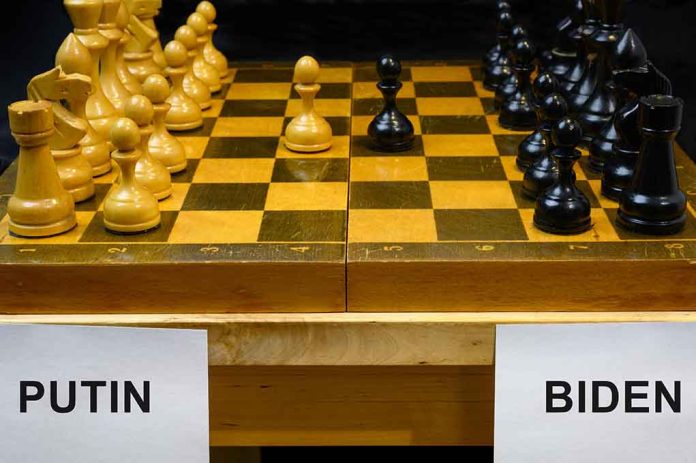
In a stunning move, a Moscow court has frozen $372 million belonging to American banking giants, escalating the financial war between Russia and the West.
At a Glance
- Moscow Region Arbitration Court froze $372 million in funds of JP Morgan Chase and Bank of New York Mellon
- Action initiated by Russia’s deputy prosecutor to defend national interests
- Linked to Ukraine’s central bank withdrawing MR bank’s license, a subsidiary of Russia’s Sberbank
- Prosecutor’s office accuses Ukrainian regulators and U.S. banks of “expropriation”
- Highlights growing tensions between Western financial institutions and Russian interests
Russia Strikes Back: U.S. Banks Caught in the Crossfire
In a bold counter-move against Western sanctions, the Moscow Region Arbitration Court has frozen a staggering $372 million in funds belonging to U.S. banking giants JP Morgan Chase and Bank of New York Mellon. This judicial action, initiated by Russia’s deputy prosecutor, purportedly aims to defend the interests of the Russian Federation amidst escalating economic tensions with the West.
The frozen funds, held by the Russian branches of Citibank and Morgan Chase Bank, have become pawns in a larger geopolitical chess game. This move is directly linked to the Ukrainian central bank’s decision to withdraw the license of MR bank, a subsidiary of Russia’s state-owned Sberbank, with plans to wind up the bank by 2025. The Russian prosecutor’s office has not minced words, accusing Ukrainian regulators and the U.S. banks of outright “expropriation” of MR bank’s property.
The Stakes: Billions in the Balance
The financial implications of this court order are enormous. The prosecutor’s office claims that $121 million in JP Morgan Chase and $251 million in Bank of New York Mellon rightfully belong to Sberbank. This action, they argue, has denied Sberbank judicial control over its subsidiary and the right to its income. It’s a clear message from Moscow: Western financial institutions operating in Russia are not immune to the consequences of their governments’ actions.
🇷🇺🇺🇸PUTIN TO U.S: I CAN FREEZE ASSETS TOO – $400 MILLION WORTH
In a high-stakes legal move, a St. Petersburg court has frozen JPMorgan Chase & Co.'s assets in Russia. Why? VTB Bank, Russia's second-largest, claims JPMorgan owes them $440 million.
The court action stems from… https://t.co/twz1Gsj0LF pic.twitter.com/wnv49V5Tos
— Mario Nawfal (@MarioNawfal) April 24, 2024
A Wider Pattern of Financial Warfare
This isn’t an isolated incident. In a separate case, a Russian court ruled in favor of VTB Bank to recover a whopping $439.5 million from JPMorgan Chase, funds that were frozen in U.S. accounts following Russia’s invasion of Ukraine. The court didn’t stop at freezing funds; it ordered the seizure of JPMorgan’s assets in Russia, including property. This escalation demonstrates Russia’s willingness to use its legal system as a weapon in the ongoing economic conflict.
The Biden administration’s extensive sanctions and trade restrictions on Russia since the Ukraine invasion have clearly provoked a forceful response. President Biden’s recent signing of a foreign aid bill, granting U.S. officials new powers to seize Russian assets, has only added fuel to the fire. This tit-for-tat approach is rapidly transforming the global financial landscape into a battlefield, with American banks caught in the crossfire between Western sanctions and Russian retaliation.
The Conservative Perspective: A Wake-Up Call
From a conservative standpoint, this situation highlights the dangers of an overzealous foreign policy that puts American businesses at risk. While the intention to support Ukraine is understandable, the Biden administration’s approach has exposed U.S. financial institutions to significant legal and financial jeopardy in Russia. This could have far-reaching consequences for American economic interests abroad and potentially impact the stability of our banking sector at home.
Moreover, this incident underscores the need for a more nuanced and strategic approach to international relations. The current administration’s heavy-handed sanctions policy seems to be backfiring, pushing Russia to take increasingly aggressive economic measures. This not only threatens American business interests but also risks further destabilizing the global financial system at a time when economic stability is crucial.
As conservatives, we must question whether this escalating financial warfare serves America’s long-term interests. The freezing of these funds should serve as a wake-up call to policymakers about the real-world consequences of their decisions on the global stage.






















